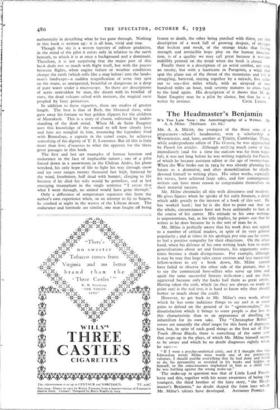The Headmaster's Benjamin
It's Too Late Now : the Autobiography of a Writer. By A. A. Milne. (Methuen. x2s. 6d.) Mk. A. A. MILNE, the youngest of the three sons of a preparatory - school's headmaster, won a scholarship at Westminster, and, later, another at Trinity, Cambridge. There, while undergraduate editor of The Granta, he was approached by Punch for articles. Although nothing much came of this immediately (and for a time the outlook was far from hope- ful), it was not long before he was writing regularly for Punch, of which he became assistant editor at the age of twenty-four. When the War broke out in 1914 he was already planning his future as a dramatist, and after demobilisation he chiefly devoted himself to writing plays. His other works, especially his verses, have achieved large sales, and few contemporary writers can have more reason to congratulate themselves on
their material success.
Mr. Milne chronicles all this with directness and modesty. He gives figures when he speaks of his early finances, a detail which adds greatly to the interest of a book of this sort. He has worked hard ; but he is the first to point out that on the whole, circumstances have not been unfriendly to him in the course of his career. His attitude to his own writings is unpretentious, but, as his title implies, he points out that he writes as he does because he is the sort of man he is.
Mr. Milne is perfectly aware that his work does not appeal to a number of critical readers, in spite of its very general popularity ; and at times in his apologia pro vita sua he seems to feel a positive sympathy for their objections. On the other hand, when his defence of his own writing leads him to make generalisations about art and literature, his arguments some- times become a shade disingenuous. For example, although it may be true that large sales cause envious and less successful fellow-writers to cry a book down, Mr. Milne cannot have failed to observe the other side of the picture, that is to say the commercial best-sellers who serve up time and again the same successful literary irish-stew ; and are then aggrieved because only the hacks hail them as great artists. Having taken the cash, which (as they are always so ready to point out) is the real test, it is hard to know why they should
bother so much about the credit.
However, to get back to Mr. Milne's own work, about which he has some judicious things to say and is at some pains to defend on the ground of its " sentimentality," the dissatisfaction which it brings to some people is due less to this characteristic than to an appearance of dwelling on infantilism for its own sake. The " Christopher Robin " verses are naturally the chief target for this form of deprecia- tion, but, in spite of such good things as the first act of The Truth About Blayds, there is something of the same sort that crops up in the plays, of which Mr. Milne himself seems to be aware and which he no doubt diagnoses rightly when
he says:—
" If I were a psycho-analytical critic, and if I thought that this Edwardian writer Milne were worth one of my portentous volumes, I should ascribe everything that he had done and failed to do, his personality as revealed in his books and hidden in himself, to the consciousness implanted in him as a child that he was battling against the wrong make-up."
The make-up in question was that of Little Lord Faunt- leroy and this, together with his acute awareness of being the youngest, the third brother of the fairy story, " the Head- master's Benjamin," no doubt shaped the form into which Mr. Milne's talents have developed. AI•rrHoNY POWELL.


































 Previous page
Previous page